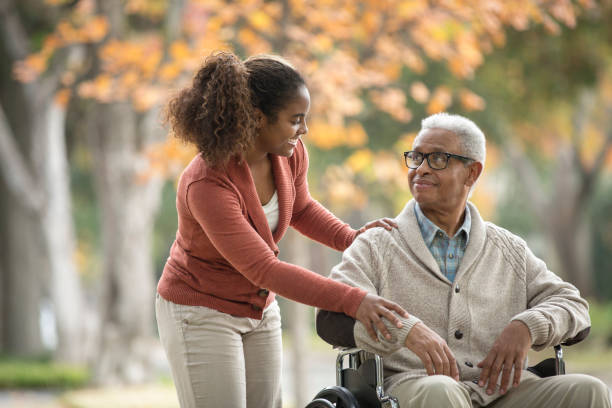Caring for aged people is an essential responsibility that requires a lot of attention, patience, and love. Aging is a natural process that affects everyone, and understanding the challenges and opportunities that come with this stage of life is essential for promoting healthy aging and ensuring that older adults can enjoy a fulfilling and meaningful life.
As people age, they may face many physical and cognitive challenges that make it difficult for them to perform their daily activities. As a result, they may require special care and attention to maintain their physical and emotional health. In this article, we will discuss some challenges faced by elderly people and essential tips for caring for them.
Who Is An Aged Person?
An aged person, also commonly referred to as a senior citizen or elderly person, is typically someone who has reached an advanced stage of life beyond middle age. While there is no universally accepted definition of what constitutes being “aged,” it is generally considered to be a stage of life marked by physical, social, and psychological changes associated with growing older.
In many cultures, an individual is considered to be a senior citizen at the age of 65 or older. However, this age may vary depending on factors such as an individual’s health, lifestyle, and cultural background.
Common Challenges Faced by Elderly People
Aging is a beautiful experience, but as we age, we often face challenges that can make our day-to-day life more complex. These challenges can come in many forms, including physical, emotional, and social obstacles. Here are some of the common challenges faced by elderly people:
Health Issues
As we age, our bodies become more susceptible to health issues such as chronic diseases, weakened immune systems, and cognitive decline. These health issues can impact our ability to perform daily activities, which can lead to a decline in our overall quality of life.
Limited Mobility
As we age, our bodies may become less flexible, leading to limited mobility. This can make it challenging to perform simple tasks such as getting in and out of a chair, using the bathroom, or even getting dressed.
Social Isolation
Many elderly people live alone or in care homes, which can lead to social isolation. This lack of social interaction can cause feelings of loneliness and depression, which can have a negative impact on mental and physical health.
Financial Concerns
Retirement can be a challenging time financially, as many elderly people rely on fixed incomes such as social security or pension payments. These fixed incomes may not be enough to cover the cost of healthcare, housing, and other expenses.
Caregiving Responsibilities
Many elderly people require assistance with daily activities, which can put a strain on family members or caregivers. The responsibility of caregiving can be emotionally and physically taxing, leading to stress and burnout.
7 Effective Tips for Caring Aged People
If you are wondering how to care to aged people, here are practical and effective ways to do so:
1. Ensure safety
Safety is a critical concern for aged people. Older adults may be more susceptible to falls, which can lead to serious injuries. It is essential to take steps to ensure their safety at all times.
This includes making sure their home environment is free of hazards, such as clutter or loose rugs, and installing handrails and grabs bars in the bathroom and other areas of the home where they may need support.
2. Provide proper nutrition
Nutrition plays a vital role in maintaining the health and well-being of aged people. Older adults may have difficulty eating or digesting certain foods, which can lead to malnutrition.
It is essential to provide a well-balanced diet that includes plenty of fruits, vegetables, lean proteins, and whole grains. Also, it’s important to monitor their fluid intake to ensure they stay hydrated.
3. Encourage physical activity
Physical activity is essential for maintaining strength and mobility in older adults. Encouraging aged people to engage in regular exercise can help reduce the risk of falls, improve their balance and coordination, and increase their overall sense of well-being. Activities such as walking, swimming, or yoga can be suitable for aged people and help them stay active.
4. Foster social connections
Social connections are essential for emotional and mental well-being, especially for aged people. Encouraging them to participate in social activities can help reduce feelings of isolation and loneliness. Activities like joining a senior center or taking part in a hobby group can help them maintain social connections and provide a sense of community.
6. Promote good hygiene
Good hygiene is crucial for maintaining physical health, especially for aged people. It is essential to ensure they maintain good personal hygiene, such as bathing regularly, washing their hands, and brushing their teeth. Also, it’s crucial to ensure their living environment is clean and free of germs to avoid the spread of infections.
6. Regular check-ups and medication management
Regular medical check-ups are essential for monitoring and managing any underlying health conditions. It’s essential to ensure they take their medication as prescribed and to manage any side effects of the medication. Also, it’s crucial to ensure they understand their medication regimen, including any dietary restrictions or interactions with other medications.
7. Support their mental health
Mental health is as crucial as physical health, especially for aged people. Depression and anxiety are common in older adults, which can lead to a decline in their physical health. It’s essential to provide emotional support and encourage them to seek professional help if needed.
Conclusion
Caring for aged people requires attention, patience, and love. Ensuring their safety, providing proper nutrition, encouraging physical activity, fostering social connections, promoting good hygiene, regular medical check-ups, medication management, and supporting their mental health are essential tips for caring for aged people.
As caregivers, it is essential that you also take care of yourself by taking breaks or seek for extra support from families to avoid burnout. Following these tips can help maintain their physical and emotional well-being, improve their quality of life, and allow them to age gracefully.
AUTHOR’S BIO:
Damilola Elewa is a microbiologist, author, writer, and SDG 5 instructor. She is passionate about enlightening the public on health issues through information and advocacy. Website: Askclinik Twitter: askclinik Facebook: Askclinik
YOU SHOULD ALSO READ:
- How To Keep Your Face Clean
- How To Care For Your Body After Childbirth
- How to Care for Your Dreadlocks
- How to Care For Your Grey Hair
- How to Grow Virgin Hair in Nigeria
- How to Keep Your Toenails Healthy
- How to Keep Your Armpits Clean and Fresh
- How to Take Care of Your Pancreas
- How To Take Care Of Your Towel
Collins Nwokolo is a human physiologist, writer and health enthusiast. He loves writing helpful articles on health and fitness, which he enjoys sharing with everyone.








